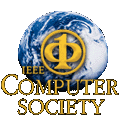23rd IEEE |
International Performance Computing and Communications Conference |
|
|
IPCCC 2004 - April 15-17, 2004 - Phoenix, Arizona |
| ||||||
Keynote Speakers
|
Thursday, 8:15 to 9:15 amDr. Nick Tredennick, "Reconfigurable Systems Emerge"Abstract: As the world shifts from tethered to mobile, reconfigurable systems will emerge. After twenty years of progress, the PC is good enough for most consumers. As PC development becomes less profitable, design emphasis shifts to mobile systems such as digital cameras, MP3 players, and cell phones. Mobile systems change the design goal from cost performance to cost-performance-per-watt. Smaller transistors won't help because they are too expensive and they leak too much. The microprocessor, which has held back advances in hardware design for thirty years, won't be the workhorse in mobile systems of the future. Microprocessors and DSPs are unsuitable for mobile systems because instruction-based processing is computationally inefficient and because they use too much energy. Today's memory components are also unsuitable for mobile systems. New programmable logic devices based on next-generation non-volatile memory will enable efficient reconfigurable systems.Speaker Bio: Dr. Nick Tredennick has been a dishwasher, Air Force pilot, oil field worker, Navy captain, truck driver, engineer, and janitor. At Motorola he developed the logic and microcode for the Motorola 68000 microprocessor (used in the original Apple Macintosh computer). At IBM's Watson Research Center he designed the Micro/370 microprocessor. He was Chief Scientist at Altera. Nick has founded several Silicon Valley startups and is an investor or member of the technical advisory board of numerous others. He taught at the University of Texas at Austin and U.C. Berkeley, is a Fellow of the IEEE, a registered professional engineer, and represents the IEEE on the Engineering Accreditation Commission. Nick is an editor of Gilder Technology Report and serves or has served on the editorial advisory boards for IEEE Spectrum, for Microprocessors and Microsystems, for Embedded Developers Journal, and for Microprocessor Report. He has published more than fifty technical works, including a textbook on microprocessor design (Microprocessor Logic Design), and holds nine patents. |
|
Friday, 8:15 to 9:15 amDr. Taieb (Ty) Znati, "Future Directions in Networking Research: Are We Done Yet?"Abstract: The advances in networking research of the last decade have focused primarily on enabling connectivity and reachability for a diverse range of technologies and a broad range of applications. These advances have created a conceptual framework and a sound theoretical base that have proven to be of enduring value in the development of the Internet. The increasing capabilities and ever-decreasing costs of computation and communication devices, however, are paving the way for a new generation of massively distributed, highly heterogeneous networks. These networks are likely to exhibit unpredictable and complex behavior and dynamics, giving rise to a new set of exciting and challenging network problems, where scalability, robustness, adaptability, and security play key roles. This talk focuses on a range of networking research and challenges that need to be addressed to understand the behavior of complex, large-scale networks designed to serve a broad range of applications while achieving a high level of flexibility, reliability, robustness and security.Speaker Bio: Dr. Znati obtained a Ph.D. Degree in Computer Science at Michigan State University, East Lansing, in April 1988, and a Master of Science Degree at Purdue University, West Lafayette, Indiana. In 1988, he joined the University of Pittsburgh where he currently is a professor in the Department of Computer Science with a joint appointment in Telecommunications in the Department of Information Science. His current research interests focus on the design of network protocols for wired and wireless communication networks to support multimedia applications' QoS requirements, the design and analysis of medium access control protocols to support distributed real-time systems, and the investigation of fundamental design issues related to distributed systems. He is frequently invited to present lectures and tutorials in networking and distributed multimedia related topics, in the United States of America and abroad. Dr. Znati is a member of the Editorial Board of IEEE Transaction of Parallel and Distributed Systems, the Wireless Networks Journal of Mobile Communication, Computation and Information, the Journal of Adhoc Networks, the International Journal of Parallel and Distributed Systems and Networks, and the Journal on Wireless Systems and Mobile Computing. He will serve as the General Chair of Infocom 20001. Dr. Znati is currently on leave from the University of Pittsburgh to serve as Senior Program Director for Networking Research at the National Science Foundation. He also served as the Committtee Chair of the Information Technology Research Program at the National Science Foundation.
|
|
Webpages from previous conferences: IPCCC 1998 IPCCC 1999 IPCCC 2000 IPCCC 2001 IPCCC 2002 IPCCC 2003 |
|
| ||
| For questions, suggestions, or problems with the IPCCC website, please email the webmaster. |  |
 |